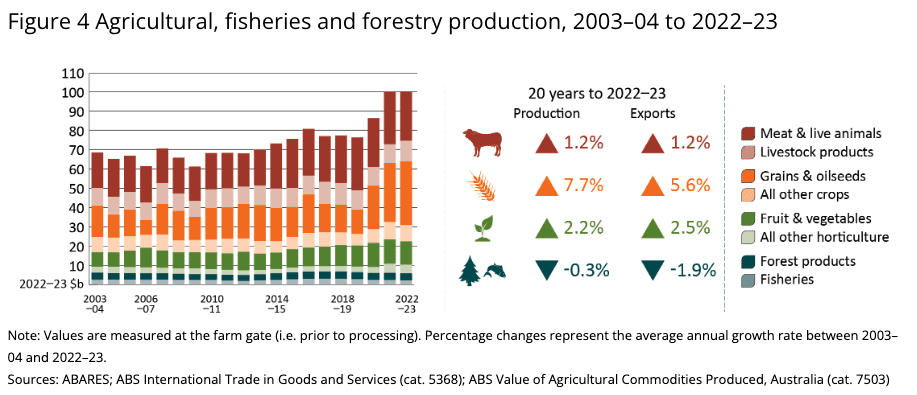Today’s ABARES Snapshot of Australian Agriculture shows how the farm sector has positioned itself as a powerhouse in the nation’s economy, but alarm bells are ringing over the already slowing productivity rate which is only predicted to worsen.
The report shows the gross value of agricultural production has increased by about 51% in the past 20 years, but productivity growth has reduced from an average 2.18% to just 0.6% each year since 1999-2000.
National Farmers’ Federation President David Jochinke said while annual headline production figures were subject to seasonal conditions and markets, the productivity growth slowdown was a concerning trend.
“Agriculture is predicted to reach $90.8 billion Gross Value of Production this year, the third highest on record. This is a great result and shows how resilient farmers are in the face of increasingly unpredictable weather extremes and disruptive supply chains,” Mr Jochinke said.
“Farmers are adopting cutting edge technology and clever sustainability practices to increase production in a world demanding more food and fibre than ever before.
“But they are being swamped with poor policy, growing administrative burdens and green tape.
“Bad policy decisions being made in Canberra are hampering farmers’ ability to drive the growth needed to become a $100 billion industry by 2030.”
The NFF has highlighted in its “Keep Farmers Farming” campaign how Australia has lost more than 15% of its farmland in the past 30 years while current policies re also reducing access to workers and water.
“Proposed transmission lines and the push to offsets on farmland are only going to continue to send that figure north,” Mr Jochinke said.
“Productivity growth will continue to slump unless farmers and policy makers work together.
“By finding smarter options for land use, reforming competition laws, developing better pathways for workers, and reversing the decision to ban supply of sheep by sea to the Middle East the Federal Government can boost productivity.
“Farmers are ready to unlock the agriculture’s economic potential, but we can’t do that under restrictive rules and shutting down trade.
“Getting these things right is good for our farmers, is good for our economy and it is good for Australian families grappling with the cost of living.”
Source: NFF

